The agriculture startup: A stepping stone for Bangladesh 2.0
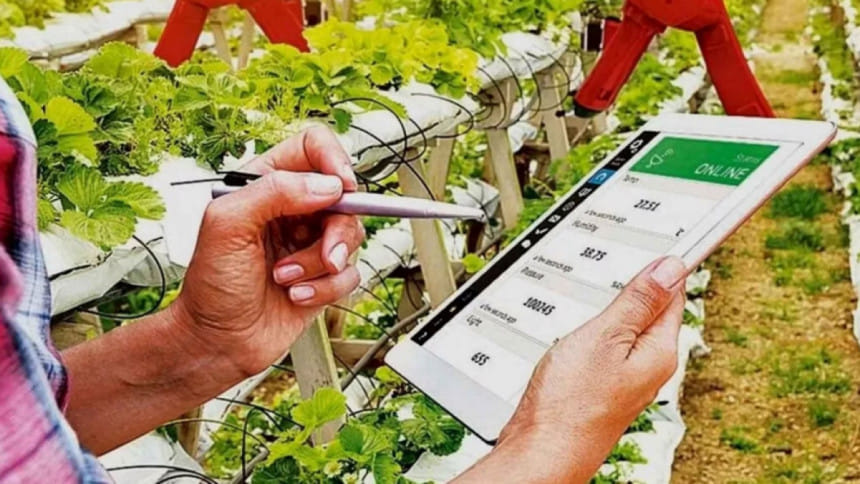
Agriculture, one of the most dynamic sectors of our country, has faced challenges and monopolistic syndicates since the country's independence when its contribution to GDP (Gross Domestic Product) stood around 60 percent. By 2010, this figure dropped to 17 percent and, after nearly a one percent reduction every two years, stabilised at 12.7 percent in 2020.
Following that, last year, it further declined to 11.20 percent. In line with the international trend, obsessing over industrialisation results in the country's strong suit —agricultural strengths — being left behind. However, agricultural startups like iFarmer, ShobjiGram, Agroshift, and Freshie Farm, have been inspiring people from diverse backgrounds to explore this unconventional yet viable path. Surprisingly, many of these startups' founders lack formal agriculture backgrounds . They simply realised that the country's most flourishing sector was being overlooked for a long period, and saw it as high time to revisit the sector.
In rural areas, almost every labourer has basic knowledge of primitive forms of farming. Yet, exiguous wages in less-facilitated traditional farms oblige them to switch agriculture jobs. On the other hand, in recent times, agriculture startups usually prefer a B2C (Business-to-Consumer) model to sell their products. Consequently, it reduces the intermediaries, and their possibility of defending the local syndicates tends to be higher than others. As a result, it enables startups to sell quality products to customers at the market price. On the other hand, it also enables them to hire labourers at fair wages. This is why experienced workers' participation in agriculture startups is eye-catching. Experienced workers are behind the scenes of improbable outputs within a relatively short time in agriculture startups, which were suppressed in the loop of local syndicates for a long time.
"Suppose a new pest starts to ruin your cornfield. Your first point of contact should be the district agriculture officer. But interestingly, you will never find them because they haven't been at the office for two or three years," stated Muntasir Hafiz, co-founder and CEO of ShobjiGram, in an interview. Several government-run agriculture research centres have existed for a significant period of time in Bangladesh. However, thoughtheir research achievement is remarkable, implementation in the country is negligible. We often see agriculture officers conducting training sessions for grassroot farmers only on television; in real life, these are rare. Low wages, local syndicates, reluctance of the private sector, insufficient funding, unexpected natural calamities, scanty amount of governmental support, skyscraping transportation expenses, and some other issues continue to intensify the frustrations of farmers day by day, leading to striking cultivable lands remaining abandoned in almost every district.
Now, Vietnam is known as an "Agriculture Powerhouse" and a core competitor of Bangladesh in the agriculture sector. Vietnam's farming sector is diversified, with items like rice, nuts, fruits, and fish—nearly similar to our country. Despite this, Bangladesh struggles to prosper due to the lack of national interest in this particular sector. Many of us still regard white-collar jobs as respectable professions, regardless of whether there is social encouragement or not.Meanwhile, choosing a profession that requires working in a muddy field with farmers to ensure there is food on your dining table is discouraged. In contrast, the Vietnamese government, along with the private sectors, have embraced new farming methods, modern technology, and proper infrastructure—successfully illustrating their country as a global agricultural model.
In his book A World of Three Zeros: The New Economics of Zero Poverty, Zero Unemployment, and Zero Net Carbon Emissions, Nobel laureate Dr Muhammad Yunus, the chief adviser to the interim government, urges the youth to break the chain of inequality, massive unemployment, and environmental destruction in this world.
Culturally, in Bangladesh, where instant gratification is preferred, agriculture startups could spark interest through their comparatively low investment costs and swift returns. Furthermore, a thriving agriculture startup sector would contribute to other visions of DrYunus. This Nobel laureate's perspective also breaks apart the narrow mindset of those who think cultivating and grazing is a fragile profession. The success of iPAGE, a United Nations award-winning Bangladeshi startup that aids farmers through securing information, technology, training, and services for farmers, also highlight the viability of this approach. This startup also works on reducing negative impacts on climate and the environment.
As farming sector investment does not require a brokerage house hassle, and with a BO (Beneficiary Owner) account maintenance and 24/7 data-driven awareness like the stock market, the farming sector can be more effective for investors. Conversely, investors cannot sell their agricultural shares anytime like the stock market due to its lack of liquidity. Despite this, agriculture startups still offer convenient investment opportunities.
In 2022, Agroshift raised $1.8 million, and iFarmer raised $2.1 million in funding. Moreover, Freshie Farm offers projectile investment where investors can trace the project performance through the website and app. Fashol, another agri-tech startup, raised $1 million in pre-seed funding last year.
However, no country can keep pace in the global run by only focusing on agricultural progression. Technology and advancement in industrialisation are equally crucial. Indeed, the ignorance of existing agriculture expertise might cost lifelong compensation. When you cannot breathe fresh air, your city is unsuitable for living, and the country's experienced farmers are unwillingly choosing inhumane professions like paddling rickshaws, technology startups alone can seem like a luxury. Supporting the farmers through agriculture startups, alongside environment-friendly industrialisation and relevant digitalisation, can ease the pathway toward a self-sufficient Bangladesh.
Faizur Rahman Khandaker is content writing intern at NSU Startups Next of North South University.
Views expressed in this article are the author's own.
Follow The Daily Star Opinion on Facebook for the latest opinions, commentaries and analyses by experts and professionals. To contribute your article or letter to The Daily Star Opinion, see our guidelines for submission.

 For all latest news, follow The Daily Star's Google News channel.
For all latest news, follow The Daily Star's Google News channel. 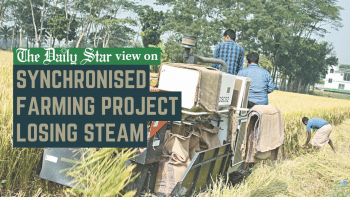
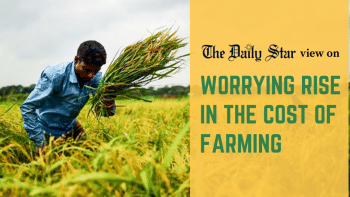
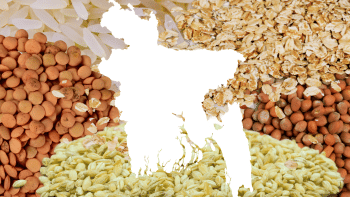


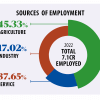
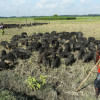

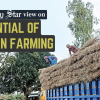


Comments